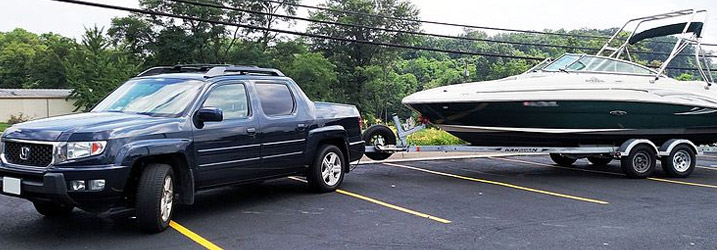
By User:McChizzle [Public domain], via Wikimedia Commons
Owning your own boat is a dream that many aspire to, but relatively few have the added advantage of owning their own private mooring or being able to afford a berth in a marina. The answer for a lot of people is to tow or trailer their boat to a suitable launch site, but to get there without mishap you need to know what you are doing with a load in tow. It is well worthwhile learning or reminding yourself of some basic safe-towing tips.
Be aware of towing regulations
- Watch the speed limit. You are restricted to 50mph on single carriageway roads, 60mph on dual carriageways and motorways provided no lower limit is inforce. In the UK you are not allowed to use the outside lane of a 3 or more lane motorway, except when lane closures permit.
- Watch your weight. Your car must be up to the task of towing your load. Look at your manufacturer’s handbook to establish your car’s maximum towing weight. As a rough guideline use the 85% rule if towing a trailer with brakes (only tow a trailer etc. that weighs up to 85% of your car’s kerb weight) and the 50% rule if towing something without brakes. In practice most people buy a boat or boat trailer when they already have a car, so don’t get carried away when buying your boat. When carrying a boat on a trailer approximately 60% of the boat’s weight should be positioned on the front half of the trailer and 40% in the rear. The boat should also be balanced from side to side and firmly secured with ratchet type straps.
- Watch your size. You need to factor in the length and width of your trailer or boat as well as its weight. The DVLA has strict rules on this, so make sure you do your research.
- Watch your limits. You must be aware of what your driving licence permits you to drive. This will vary depending on when you passed your driving test so read the small print carefully.
- Watch your insurance. As well as having insurance for the car, you must also have third party cover for your trailer or boat.
- Protection. If you are towing a boat with an outboard motor you must use a reinforced plastic bag or bucket over the propeller and outboard legs. Similarly any sharp edges or points on masts which could cause injury must be protected.
Practical Tips
- Make sure your car and trailer are regularly serviced and maintained. Remember that towing puts additional strain on your car. It’s not a good idea to leave your trailer unused for most of the year before taking it out on the road. Check tyres and brakes regularly.
- Check lights and electrical cables and make sure none are dragging on the road.
- Check your boat or trailer is securely connected to the towing ball of your car – you don’t want it coming loose or being loosened by vandals, so do this regularly.
- You can attach extensions to your car’s wing mirrors to give a better view. They are easily fitted but must be removed when you are not towing.
- Many people who tow choose a hefty four-wheel drive car. They have the advantage of extra weight, strength and grip and are more suited to manoeuvring a boat or trailer down a slipway.
- You will need to adjust your driving style to suit your additional load. Think “gentler and slower”. Don’t forget that you have something behind you and exercise caution when manoeuvring. Safe stopping distances will be different and road conditions such as wet surfaces and crosswinds will have more effect on your driving. Be aware of how your trailer or boat is handling and be prepared to stay at home if the conditions are too bad.
- You may consider doing a towing course to refine your abilities. At the very least, take some time to practice manoeuvring with your trailer or boat behind you – turning corners and reversing in particular.
- Make sure your fuel, oil and water are all topped up before setting out, remembering that you will probably use more than usual when you are towing.
- When parking try to do so on flattish land. If you are forced to park on a hill use wheel chocks to help to secure the vehicle.
There may seem an awful lot of regulations and practicalities before you even get your boat in sight of the water. But when you consider the cost of your boat, your car and your trailer, as well as the hours of excitement and adventure you will have when you actually get your boat launched, it’s imperative to do it right. Happy Boating!